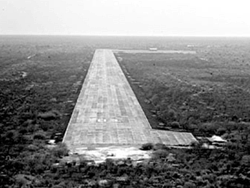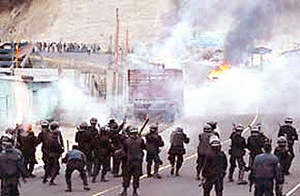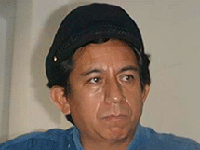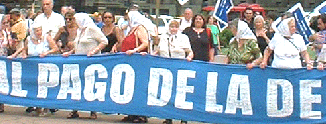
Americas


The Wholesale Looting of the Gulf Coast
If you are more interested in and disgusted by rumors of civilian "troublemakers" on the streets of New Orleans and other Gulf Coastal communities than in the massive failings of the United States government before, during and since this tragedy began, consider a career in journalism.
The real criminals are sitting in positions of authority: the president, the director of FEMA, and the hundreds of congresspersons cutting their excessive vacations short to pat one another on the back as they pass emergency funding provisions for the hardly-operative relief efforts centered in Louisiana and Mississippi.

Gold Mine in Guatemala Faces Indigenous Resistance
Indigenous communities in the western highlands of Guatemala who are organizing against an illegal gold mine in the face of violence and repression are beginning to see the fruits of their labor. The Canadian/U.S. mining company Glamis Gold operates the World Bank funded project. Construction of the open-pit gold mine is nearly complete, with the company eager to start the drilling. Local community members claim the World Bank and Glamis Gold violated international law when they failed to consult them and gain their consent for the "Marlin" mine project. Yet Glamis counters that it consulted with the community, that the project has broad support and that international NGO's and a few individuals are solely responsible for orchestrating the "small" opposition to the mine.

Keys to Understanding Bolivia: An Interview with Oscar Olivera
Win the elections and arrive at a Constitutional Assembly that changes the roots of the power structure in

The New American Security State
Fresh on the heels of the London bombings, the U.S. government has been quick to exploit these incidents to further usher in the new security state, which claims to protect citizens from a threat it wishes the public to imagine requires governmental solutions. Never mind that none of these new measures actually increase anyone's security, except the security of those in power from those they govern.

The IMF and Usury: Crime Without Punishment
"Blaming the International Monetary Fund (IMF) for the difficulties faced by a country in times of crisis is like blaming the doctor for the patient's disease". This statement and others like "the IMF does not represent the interests of the G8" are part of an outrageous manual that teaches the organization's officers how to reply to the uncomfortable questions asked by the press. Perhaps, the text became effective after a reporter asked Anne Krueger - First Deputy Managing Director of the IMF - if her organization was responsible for the increasing poverty in
